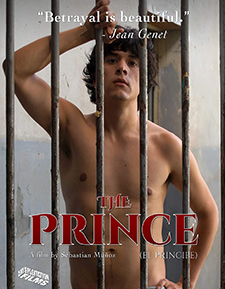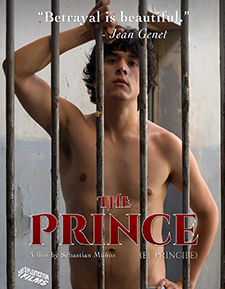Prince, The (Blu-ray Review)

Director
Sebastian MunozRelease Date(s)
2019 (July 7, 2020)Studio(s)
Nina Nino Producciones (Artsploitation Films)- Film/Program Grade: B-
- Video Grade: B
- Audio Grade: B
- Extras Grade: D
Review
The Prince (El Principe) takes place in a Chilean prison in 1970, just before Salvador Allende came to power as president of the country. The film presents a view of prison life in which the incarcerated men find love, tenderness, and freedom behind bars and concrete walls.
Jaime (Juan Carlos Maldonado) is an attractive young man imprisoned for violently murdering a friend. We don’t know his motive. He’s put in a cell with just one bunk bed already occupied by four other cellmates. The oldest, Potro, referred to as The Stud (Alfredo Castro), orders his young lover (Sebastian Ayala) to sleep on the floor and Jaime, given the nickname “The Prince,” to share Potro’s bed. Sexually assaulted on the first night, Jaime is initiated into the family.
From this point, first-time director Sebastian Munoz shows us a series of rivalries in the jail for affections, with promises of gifts including cigarettes, a guitar, and a red leather jacket. Required to provide their own food and medical care, prisoners band together as family units. A prisoner from a different cell (Gaston Pauls) visits the group and changes the dynamic among them. Munoz pulls no punches depicting the sexual activities in the showers, in bed, and up against a wall. They come across as matter-of-fact and are the norm.
Maldonado’s performance is uninhibited, complex, and engaging. With a brooding intensity, his Jaime draws us in and makes us curious to know more about him. Occasional flashbacks to episodes of his pre-prison life reveal his back story. Throughout, however, Jaime remains an enigmatic character. With little dialogue, Maldonado’s performance is mostly visual; his reactions, submissiveness, and expressions range from innocence to passion.
As the much older Stud, Castro turns in a low-key performance. The Stud may be the alpha male, but he rules with gentleness rather than intimidation. Soft-spoken, he contrasts with the bellowing guards who single him out for a painful, sadistic act to amuse themselves. Potro has no choice but to accept this treatment. To resist or fight back would only make matters worse for him.
Writer/director Sebastian Munoz and co-writer Luis Barrales include many graphic scenes of nudity and sexual acts. These are perfunctory, sudden, and frequent occurrences. The prison guards take sadistic pleasure in demeaning the inmates and fail to intervene when violence erupts lest they sustain injuries themselves.
Living in a hell with sex as the only solace, Jaime discovers a kind of salvation. In a country where his identity and sexuality must be repressed, he truly finds himself when confined among those like himself.
The Prince is extremely graphic, which tends to lean toward exploitation. Rather than suggest various acts or film them discreetly, Munoz lingers to emphasize the desperation and degradation of the men. He also focuses on relationships inspired by human needs. If the balance were better, with more characterization to draw us in, the film would appeal to a wider audience. In its present form, many may shy from its brutal images.
Featuring 1080p resolution, The Prince is presented on Blu-ray by Artsploitation Films in the widescreen aspect ratio of 2.35:1. The print is sharp, with details nicely delineated, such as objects on shelves in the cell, individual strands of hair, and reflections in water on the floor of the prison corridor. A number of scenes are extremely dark, with a bare minimum of light to outline actors. There’s an overall yellowish tone to the cell scenes, and drab colors dominate the palette. In the flashbacks, colors are brighter and contrast markedly with those in the prison.
There are two soundtrack options—Spanish 5.1 Dolby Digital Surround and 2.0 Dolby Digital, with English subtitles. The 5.1 soundtrack has good balance with sound emanating from the left, right, or center as the images require. A lot of dialogue is spoken softly, so it may be necessary to raise the volume for these scenes. A few musical interludes break up the monotony of the men’s daily routine and are ironically upbeat, with suggestive lyrics. The score, by Angela Acuna, ranges from slow and sad to uptempo and light, nicely contributing to mood.
Bonus material includes deleted scenes, behind-the-scenes interviews, and several trailers.
Deleted Scenes – Three deleted scenes are included: Meeting, Gypsy, and Foal.
Interviews – These are very brief and don’t go into significant detail about the making of the film. The total for all four interviews is only 20 minutes.
- Alfredo Castro (The Stud) describes his character as a man beaten down by life, jailed for committing a crime and, in jail, finding what he didn’t find in life—protection, love, and affection. The director felt it was best to leave the sexual aspect of the Stud’s relationship with Jaime in the background and focus on the “solidarity and love story of these lonely, suffering human beings.”
- Gaston Pauls (Che Pibe) was offered the part by director Sebastian Munoz while working with him previously. The film is important, not only because it talks about Chile, but about freedom in all countries, especially those in Latin America. Ironically, freedoms in jail are greater than on the outside.
- Juan Carlos Maldonado (Jaime)—an anti-hero—finds metaphoric freedom inside the prison. Maldonado put his trust in the director and the crew. “You let yourself go” and immerse yourself in the role.
- Luis Barrales (co-screenwriter) did not have screenwriting experience. Director Munoz had read the novel and knew exactly what he wanted. “The director thinks with his eyes, the writer thinks with words.” The director/writer collaboration was productive. “We started to create layers that relate to the construction of the whole culture.”
Trailers – Trailers for other Artsploitation releases include Animals, Benjamin, Dead Dicks, and Death in Buenos Aires.
– Dennis Seuling

